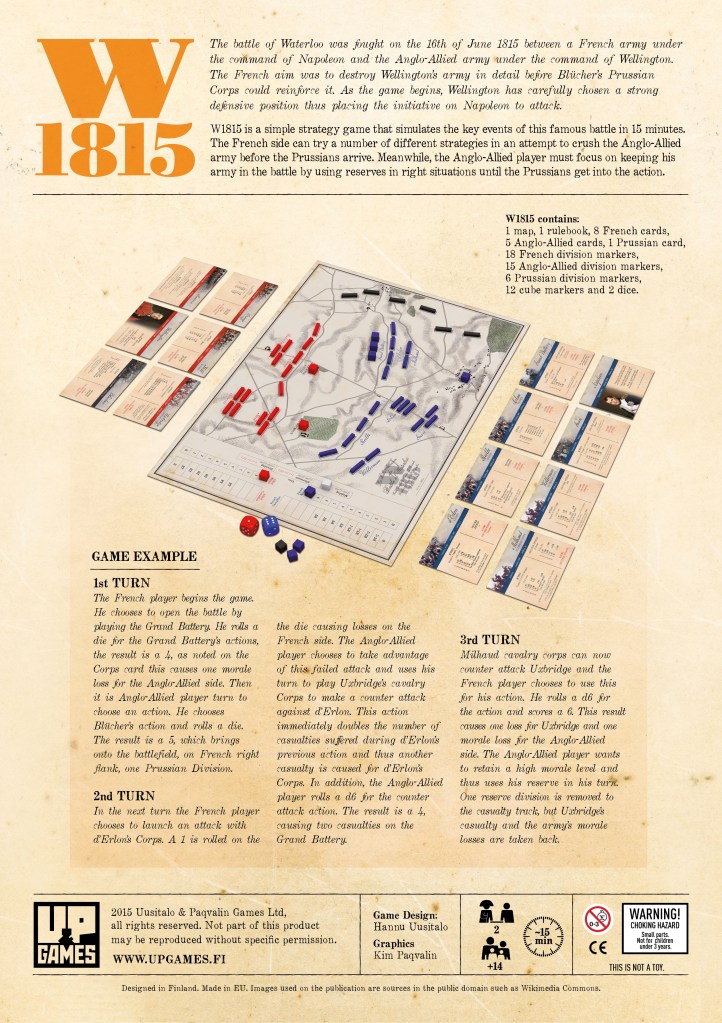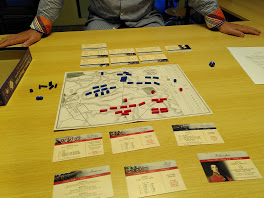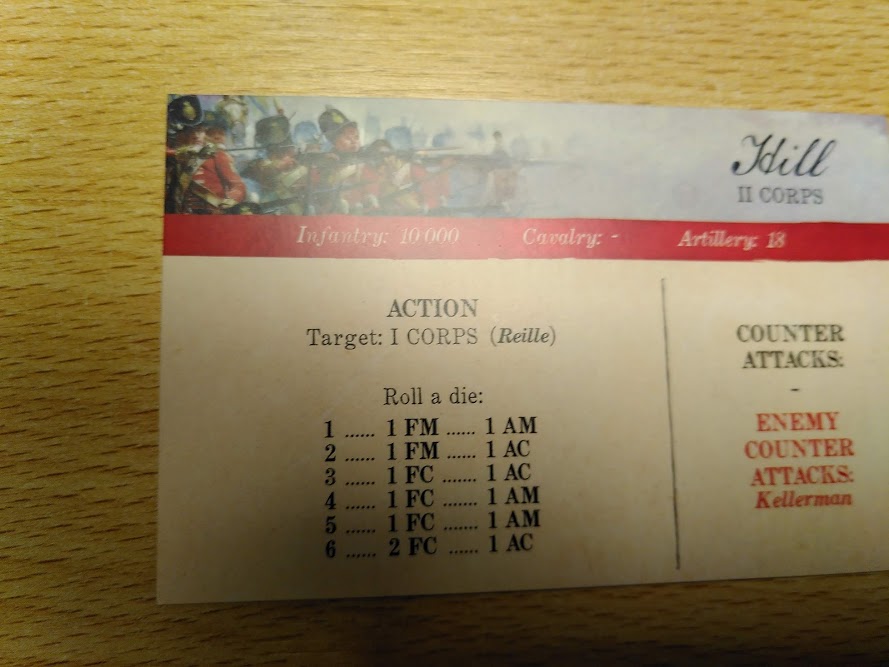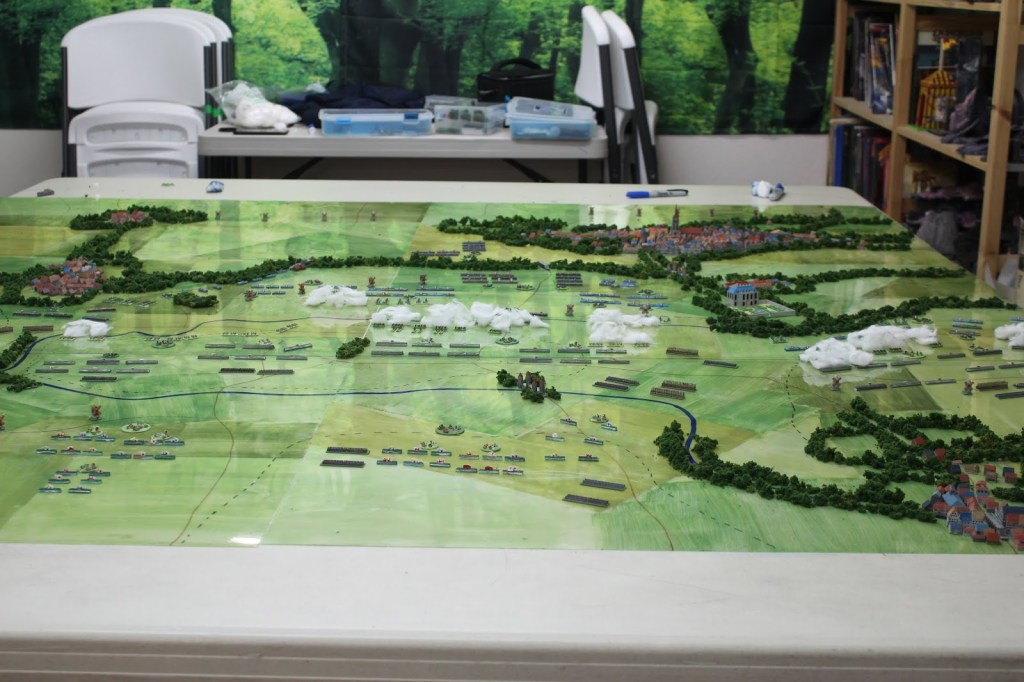Yesterday I played W1815, a MUSTHAVE game for the Napoleonic wargamer. First, it’s a very fastplay (15-minutes) and believable impression of the tactical dilemma’s of the two commanders, with a few plot twists. Second, it’s an excellent skeleton for a participation demo game in a museum, library or classroom.
This is the whole game.

Only 37 euro including shipping for a cardboard game. You can call it expensive (hey, 37 euro for just a few printed sheets and wooden blocks!) but compared to the 60, 80 or 120 euro boardgames that I usually buy, the total price including shipping is low. Besides, it’s the price/originality ratio that counts most, not the price/production ratio. I’m willing to pay relatively more if the concept is special. This game is … unique.
Yes, unique! I’m not often this positive about wargames, many use concepts seen before, but here I saw a very innovative concept. It’s if/then with a combat results table and a countdown clock. And extremely educational.
The Game
The Allies have only three corps, a reserve and Blücher off-table. The French have two large infantry corps, two small cavalry corps, a guard corps, a battery and a reserve corps. Every Allied/French corps is represented with a card. On every card is a short combat results table and if/then conditions. So the Anglo-Allied have 4 cards and 2 special cards, and the French have 6 cards and 2 special cards. That’s all.

You place the blocks on the printed map. The corps blocks are effectively ‘strength points’: if you ‘attack’ with a corps, and roll your die, the combat results table printed on the corps card will inform you how many blocks you and your lose. All lost blocks are placed in your damage pool.

You can also damage your own and/or opponent’s Morale Value, actually a breakpoint value that during the game, and depending on the flow of it, will inevitably go down from 10 to zero. Every die-rolled fight will result in losing 1-3 strength and/or 1-3 morale, and after a few turns a morale test is practically mandatory every turn. That’s the countdown mechanism.
Like Magic, you can use cards in different order or combinations, in particular the French player who has to beat the clock and defeat the Anglo-Dutch before the Prussians enter the battlefield. If you capture La Haye Sainte or Hougoumont the Guard attack card on the British corps will be stronger and might finish them off. Is that your plan? Or do you keep the Guard in reserve to cancel possible actions of the Prussians? Like chess, the game has different possible openings.
But although varied, the options are also limited because ‘conditions’ are printed on the limited number of cards: with the Grand Battery for example you can attack the Dutch corps, but not La Haye Sainte or the reserve. Does that spoil the game? Not in my opinion, you have to think fast how to use the limitations and subtle interplay in your advantage. Like chess: how do I use the pawn, that moves vertically but takes diagonally? The game was shortlisted as candidate for Boardgamegeek Best Wargame 2015.
The more and quicker strength points and morale points both sides lose, and the later it is, the bigger the risk that the tired and depleted armies break. If one of the armies breaks, the game is lost. That’s always within 15-20 minutes after the start of the game. It’s super fast play.
The (Very) Good
I played 4 quick games against my opponent Taco and every game was different. The rules force you to make a choice for a plan, and change/update that plan because of unexpected combat results. The tactical choices and limitations appeared ‘realistic’. Charge the French Grand Battery with Uxbridge? Hmm, can be devastating but comes with a big risk. Wait for the Prussians to build op pressure? The French guns might fire again and destroy my Dutch corps. Use my reserve? Then I lose the initiative.
It’s a game that you can play without nearly no rule introduction against any newbie – the combat results table and possible/mandatory moves are printed on each card. Besides you can play it without any historical foreknowledge. Even people who only know the mythical name & Waterloo station & the ABBA hit will, after one game, have understood the historical order of events and possible what-ifs.
The original game is cardboard with blocks, but if you set up a 6mm or 2mm wargame table instead of laying out a folded cardboard map, you’ll get a beautiful demo game that vividly represents the battle. Imagine something like this:

You can play several games in a row or play the same battle simultaneously on sided tables.
The (Not So) Bad
From a strictly historical point of view, the game has three downsides.
- the British player can ‘increase’ the Prussian flank pressure by playing that card, while in reality Wellington had of course no influence at all on the speed of the Prussians
- The French player can once per game use the ‘Napoleon’ card to attempt a possibly decisive extra die roll. In reality, Napoleon had an off-day and played a relatively distant tactical role.
- By sheer dice luck, flank commander Grouchy can ‘enter’ the Waterloo battlefield and hinder the Prussians. That’s fantasy, not history.
But from a gaming point of view, these mechanisms make this Waterloo game more balanced, more tense and less predictable.
For a single-battle-game, it has a high replayability value. Of course, if you play it over and over, after 10-20 games you have seen all variants. After all, it’s a game with limits. But it’s a nice quick game to play against an occasional opponent or good friend instead of a game of chess.
The Verdict
I’m extremely happy with W1815. The standard large Waterloo battle is a one day fun event with good friends, good wine, nicely painted miniatures and exquisite food – pizza and chips mostly. Instead, this simple game is a quick catalogue of tactical what-ifs that gave me a wargamer’s insight in a battle that was so far mostly words, books, history, detailed post-match analysis by pundits and a Technicolor seventies Rod Steiger movie.
W1815 is out of production or not shipped at the moment of publication of this review. Test this link to check availability, or try Ebay. But buy it if you can. It’s a must have.


Great review. I’ve played the game a couple of times myself.
I think that the Prussian card is too beneficial to the Brits too. It is a card I turned to if I didn’t want to risk the lossses on any of my other options. Although, I guess that represents the Frtench having to take the initiative on the day and attack. The Brits can always just stand there and defend themselves….
Cheers,
Pete,
LikeLike